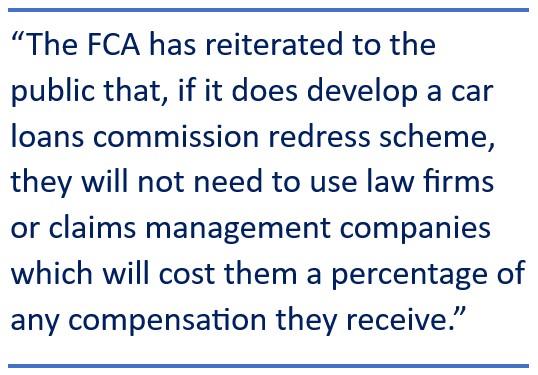- Millions expect payback 23 million drivers believe they’re owed compensation
- Public trust low Just 11% trust lenders to run any redress scheme fairly
- Pressure on FCA 40% say they’d consider legal action if redress scheme disappoints
More than 23 million people believe they could deserve compensation if the way car finance loans were sold to them is ruled to have been unlawful, according to a new poll commissioned by consumer law firm Slater and Gordon, which is one of the law firms hoping to boost its revenues from leading cases against motor finance providers.
The survey, carried out by Find Out Now, found that 45% of respondents thought they were likely to be eligible for redress on car finance agreements taken out between 2007 and 2021.
The Financial Conduct Authority (FCA) is considering setting up a formal redress scheme once the Supreme Court delivers a final ruling on the issue. which is expected to be later this month.
The FCA has reiterated to the public that, if it does develop a car loans commission redress scheme, they do not need to use law firms or claims management companies which will cost them a percentage of any compensation they receive. Claimants would be able to undertake the process themselves easily, and keep all compensation they receive.
Last month Automotive Management reported that speculative figures from claims management companies and law firms that tell consumers they could be "eligible to claim thousands" may turn out to be nonsense because the FCA has broad objectives that include encouraging healthy, competitive markets as well as protecting consumers.
The FCA said it has seen some compensation estimates based on Financial Ombudsman decisions, but notes that it may take a different approach to calculating redress and it will consider all evidence it has gathered plus the Supreme Court judgement to determine whether and how far consumers may have lost out.
Slater and Gordon, which offers a 'no-win, no-fee' service, warned that public faith in the process could be undermined if the FCA relies on lenders to determine who is compensated.
Just 23% of respondents said they trusted banks and lenders to fairly handle redress claims, and only 11% trusted them to run the scheme without oversight.
 Elizabeth Comley, chief operating officer at Slater and Gordon, said: “The public have very high expectations on the car finance scandal. They rightly expect to be compensated for their losses.
Elizabeth Comley, chief operating officer at Slater and Gordon, said: “The public have very high expectations on the car finance scandal. They rightly expect to be compensated for their losses.
“The FCA is trying put things right but there’s a risk that a redress scheme leaves many people disappointed and keen to challenge the process. That sort of backlash would be bad for everyone – the scandal would drag on for years, the courts would be inundated with challenges and the public would be denied the clear resolution they want.
“The FCA is trusted by the public to resolve this issue, but the public will not support putting decisions on redress in the hands of the lenders responsible for mis-selling – people just don’t trust the wrongdoers to decide who gets compensation.
“An FCA redress scheme that relies on the lenders responsible for mis-selling to identify people who get compensation would mean many people miss out, perhaps because they have moved address or changed their name and the lenders can no longer find them. That would be unacceptable and fuel public cynicism.”
Yet consumer trust in the FCA remains relatively strong, with 62% of respondents saying they believe the regulator will resolve the scandal fairly. In contrast, just 11% said they trusted the lenders themselves.
Comley said the best way to ensure a redress scheme works well and resolves issues swiftly is to allow people the choice to hire a lawyer to support their claim.
“Independent professional lawyers work to assemble documents and evidence, pursue people’s rights and ensure they get what’s due to them. Why shouldn’t people have this option if they want it?”
Consumer group Consumer Voice echoed those concerns. Co-founder Alex Neill said: “People are rightly concerned about the use of secret commissions in car finance. Millions of drivers feel misled and have suffered financial harm – so it’s no surprise that public expectations for compensation are high.
“Our own research shows that two-thirds of consumers would have acted differently if they’d known about dealer commissions, and many remain concerned about how those commissions impact what they pay.
“Most people trust their dealer to get them the best deal; often unaware that the finance offer in front of them may not be the most competitive, or assuming the dealer only profits from selling the car itself. Unlike other financial products, this misplaced trust means consumers rarely shop around. Only 4% told us they compared finance options before signing a deal.
He said any redress scheme must tackle drivers' legitimate distrust of lenders and be built with fairness to consumers at its core.
“People must be given choice and clear information about their options and the compensation they can expect to receive. Resolving claims quickly is in everyone’s interest, but it must not come at the expense of people being denied proper access to justice.”
The survey highlighted key risks to the success of a redress programme. Of those who believe they’re eligible for compensation:
- 57% said they had moved house during the affected period, potentially making it difficult for lenders to contact them.
- 13% said they had changed their legal name, raising further concerns over traceability.
- 36% - around 8.4 million people - said they had lost at least some paperwork relating to their old car finance agreements.
Notably, 40% of people surveyed said they would consider taking legal action if they were dissatisfied with the outcome of the FCA's redress scheme, underlining the pressure on the regulator to get the process right.
The full poll was conducted between 17–20 June with a nationally representative sample of 4,005 adults.
At the recent Finance and Leasing Association Insight25 event, experts from law firm Addleshaw Goddard advised that firms must not waste time ahead of the judgement that they should be working already to understand their customer cohorts, and what the customer journey has been, particularly looking at commission disclosures.




















Login to comment
Comments
No comments have been made yet.